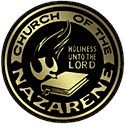Almost a Local
The renewal of our natures is a work of great importance. It is not to be done in a day. We have not only a new house to build up, but an old one to pull down. ... George Whitefield,
He was born on December 16, 1714 at the Bell Inn, Gloucester, England, and died in Newburyport, Massachusetts on September 30, 1770. In contemporary accounts, he, not John Wesley, is spoken of as the supreme figure and even as the founder of Methodism. He was famous for his preaching in America which was a significant part of the an 18th century movement of Christian revivals, sometimes called "The Great Awakening."
George Whitefield was the son of a widow who kept an inn at Gloucester. At an early age, he found that he had a passion and talent for acting and the theatre, a passion that he would carry on through the very theatrical re-enactments of Bible stories that he told during his sermons. He was educated at the Crypt School, Gloucester, and Pembroke College, Oxford. Because Whitefield came from a poor background, he did not have the means to pay for his tuition. He therefore entered Oxford as a servitor, the lowest rank of students at Oxford. In return for free tuition, he was assigned as a servant to a number of higher ranked students. His duties would include waking them in the morning, polishing their shoes, carrying their books and even doing their coursework (see Dallimore). He was a part of the 'Holy Club' at Oxford University with the brothers, John Wesley and Charles Wesley. After reading Henry Scougal's "The Life of God in the Soul of Man" he became very concerned for the state of his soul. Following a conversion experience he became very passionate for preaching his new found faith. His genuine piety led the Bishop of Gloucester to ordain him before the canonical age.

